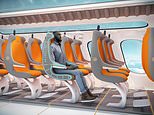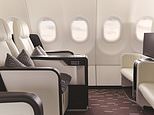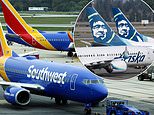
In the future, passengers will whizz through passport control in a heartbeat.
That’s because according to leading futurists and scientists, ‘biometric heartbeat passports’ will replace traditional passports, with travellers’ unique cardiac signatures being read as a form of ID.
It’s just one of the many astonishing revelations in the easyJet 2070 Future Travel Report, which presents a vision of how we will travel and enjoy our holidays in 50 years’ time, with printed hotel buffets and ‘smart’ plane seats that adapt to the shape of the passenger also on the horizon.
The report’s authors include Professor Birgitte Andersen of Birkbeck, University of London and CEO of Big Innovation Centre; Dr Melissa Sterry, design scientist and complex systems theorist; and renowned futurists Shivvy Jervis and Dr Patrick Dixon, as well as Director of Transport Systems at Cranfield University, Professor Graham Braithwaite, and Nikhil Sachdeva, Principal for aerospace and defence and sustainable aviation at consultancy Roland Berger.
They detail in the report how the airport journey and air travel experience will be ‘revolutionised by technological advances’, explaining that the biometric heartbeat passport system would see passengers’ heartbeat signatures and biometric details logged on a global system ‘in the same way finger-print scanning technology works today’.
The easyJet 2070 Future Travel Report predicts that in 50 years’ time ‘smart’ plane seats will adapt to the shape of the passenger, with inflight entertainment beamed directly in front of them
By 2070 passengers’ heartbeat signatures and biometric details will be logged on a global system, making the journey through an airport seamless
Ergonomic and biomimetic ‘sensory’ plane seats will become the norm, it’s revealed, with smart materials not only adapting to passengers’ body shapes, but also their height, weight and temperature, to provide ‘the ultimate tailored comfort flying experience’.
Inflight entertainment, meanwhile, ‘will be beamed directly in front of passengers’ eyes, via optoelectronic devices, replacing the need for onboard screens or downloading movies before you fly’.
And e-VTOL (vertical take-off and landing) air taxis will ‘do away with the airport car park shuttle’ – plus, the journey to the airport will be quicker and more convenient than ever before, with 85 per cent of passengers transported from their homes to the terminal by e-VTOLs, declare the report authors.
The accommodation experience abroad is also set to be revolutionised, and not just thanks to 3D printed hotel buffet food ‘allowing holidaymakers to 3D print whatever they want to eat for breakfast, lunch and dinner’.
The authors predict that there will be subterranean hotels built into the fabric of the earth ‘that are super energy efficient and at one with the environment’.
All hotel rooms will be ‘smart rooms’ in 2070, with guests able to pre-select bed firmness, ambient temperatures and have their favourite music playing when they open the door.
And suitcases won’t really be needed – because holidaymakers will be able to 3D print recyclable clothes upon arrival, ‘tailored to their perfect fit and style’.
Hotels’ eco-credentials will be further enhanced by their power source – guests’ footsteps.
The accommodation experience abroad is set to be revolutionised thanks to 3D printed hotel buffet food
‘Time-travelling’ holiday experiences via haptic suits will allow for visits to historical sites
TOP 15 TRAVEL PREDICTIONS TRAVELLERS WANT TO SEE BECOME A REALITY
1. ‘Time-travelling’ holiday experiences via haptic suits that allow visits to historical sites to see how life would have played out many years ago (i.e seeing Colossus of Rhodes in 280BC) – 42%
2. Seamless airport security – using biometric heartbeat passports – 38%.
3. Underwater ‘sea-faris’ taking tourists on aquatic adventures to the depths of the ocean – 32%.
4. Subterranean hotels built into the fabric of the earth that are super energy efficient and at one with the environment – 26%.
5. Smart hotels with personalised holiday rooms – that adapt and configure to travellers’ needs and wants on arrival – 25%.
6. In-ear devices will be available to take on holiday to translate the local language in real time and enable visitors to speak the local lingo – 24%.
7. ‘Try before you buy’ bionic and Metaverse holiday previews will provide. holidaymakers with a virtual experience allowing them to see, hear, smell and feel a destination before booking – 23%.
8. Ergonomic and biomimetic sensory plane seats that adapt to passengers’ body shape, weight and temperature providing ultimate comfort – 20%.
9. 3D printed hotel buffet food serving up breakfast, lunch and dinner – 19%.
10. Inflight entertainment beamed directly in front of passengers’ eyes, doing away with the need to download shows before you fly or the need for onboard TV screens – 18%.
11. Week-long holiday package trips to the moon – 17%.
12. E-VTOL air taxis taking passengers from home to the airport terminal, as well as ferrying holidaymakers around city locations abroad – 14%.
13. Autonomous rent-a-car services on location – driverless hire vehicles that ferry travellers around their holiday destination – 13%.
14. Digital holographic personal concierge – accompanying holidaymakers to provide up-to-date destination information and advice – 11%.
15. 3D printed recyclable holiday clothes available on arrival at hotel, doing away with suitcases – 10%.
Source: easyJet 2070 Future Travel Report.
Activities while on holiday in 2070 will include ‘time-travelling’ – wearing haptic (or VR) suits at historical sites to be immersed in glorious ancient world wonders – and underwater ‘sea-faris’ in mini-submarines.
And in-ear devices will translate the local language in real time.
For the report, Britons were asked to choose which of the experts’ predictions they would most like to see become a reality, with nine in ten (90 per cent) of British adults saying they were excited or intrigued by what technological advances would change travelling in 50 years’ time.
Three quarters (75 per cent) of Brits say that these technological leaps would make them more likely to go on holiday in the future.
Science presenter Dallas Campbell brings the predictions to life in a video
The survey of 2,000 British adults revealed that biometric heartbeat passports and time-travelling holiday experiences are the advancements in travel that the nation would most like to happen by 2070.
Speaking about the report, easyJet CEO Johan Lundgren said: ‘Innovation is in our DNA and we’re always challenging ourselves to think big and look at how we can make travel even easier… both today and for generations to come. From biometric heartbeat passports to time-travelling holiday experiences, travel in 2070 is likely to be very different and exciting indeed.’
TV presenter Dallas Campbell, who has brought the predictions to life in a new video, said: ‘Some of the predictions in easyJet’s new report are absolutely astonishing – a personal favourite is the idea of being able to travel back in time through haptic suits. I’d love to be able to experience the sights, sounds and atmosphere of the very first Olympic Games. With everything from the airport, aircraft and destinations set to evolve, travellers are in for some amazing developments as the travel industry continues to evolve and thrive.’
Heading up the report, Professor Birgitte Andersen of Birkbeck College, said: ‘This next 50 years will bring the largest technological advances we have ever seen in travel and tourism. Aspects of how we holiday will be transformed beyond recognition. In the future holidaymakers will be queuing at the hotel buffet to have their breakfast omelettes and fry-ups 3D printed by machines, our heartbeat will become our passport, and in-ear devices will translate the local language in real time and enable us to speak the local lingo.
‘Looking forward, by the year 2070 the destinations we fly to, the type of accommodation we stay in, and the experiences we have, will have changed immeasurably.’
Source link
CHECK OUT: Top Travel Destinations
READ MORE: Travel News



